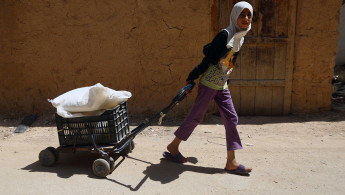Mosquito nets but no food for starving Syrian town
The lack of food is due to the Syrian regime's restrictions. President Bashar al-Assad has long refused to allow in food deliveries to this rebel-held suburb of Damascus, as part of his siege and starvation tactics against his opponents and their civilian backers.
The aid to Daraya contained medical supplies, vaccines, baby milk and nutrition items, but no food, according to Reuters.
Jakob Kern, the World Food Programme director in Syria, was quoted as saying the government had not allowed food in the first delivery, but said another convoy with food was planned for Friday.
Let them eat mosquito nets
On its Facebook page, the Local Council in Daraya criticised the lack of food aid to a town where the UN has previously warned children could die of starvation because of the "horrendously critical" situation there.
|
Activists on Twitter described the aid allowed in as "useless", mocking the presence of mosquito nets -- ostensibly sent to combat an outbreak of Leishmaniasis -- but no food.
A Russian-coordinated 48-hour local ceasefire, a "regime of calm" had been agreed with the Syrian authorities and with the United States "to secure delivery of humanitarian aid to the population".
But local council member Hussam Ayash told The New Arab no official ceasefire agreement had been concluded by the rebels."The rebel forces controlling Daraya are commited to the cessation of hostilities that came into force in February, but it is the regime that has not ceased targetting the town and its farmlands, with attempts to advance and take it," he said.
Even on Wednesday, "the regime forces violated the Russian truce, firing rockets into the town and shelling farmland to deny more than 8,000 besieged civilians there any access to food," Ayash added.
Air drops
Speaking to Reuters on Wednesday, Syrian opposition negotiator Basma Kodmani said the aid to Daraya and nearby Moadamiyah, another besieged zone, was only a first step that had come about as a result of extreme international pressure on the Syrian government, and substantial change was still needed.
"The first lesson is that pressure and ultimatums are the only way we get the regime to hear anything," she said. "We will obviously not be content with one convoy as happened today."
The trucks got through on the day when the Syrian government faced a deadline to admit aid by road or risk having air drops imposed by the countries of the International Syria Support Group (ISSG), which includes Syria's ally Russia.
"If we don't see substantial change, then we definitely are waiting for those air drops to happen as a sign of the seriousness and the commitment of the international community," Kodmani said.
The US State Department called on Wednesday for the World Food Program to move ahead with planning to deliver humanitarian aid to besieged Syrian communities by air, Reuters reported, saying ground delivery of aid has been insufficient to help those caught in the civil war.
State Department spokesman John Kirby said some aid had been delivered by ground to two Syrian communities on Wednesday, but the frequency "is far from sufficient" to provide the kind of relief needed by hundreds of thousands of Syrian people. "The United States supports the World Food Program moving forward on their planning to carry out air operations to provide additional aid," Kirby said.
Earlier, British Foreign Secretary Philip Hammond said Syria's government had "cynically allowed limited amounts of aid" into the two besieged areas but failed to deliver the widespread humanitarian access called for by the international community.
"While air drops are complex, costly and risky, they are now the last resort to relieve human suffering across many besieged areas," he said in a statement. "Countries with influence over the Assad regime such as Russia and Iran must now ensure that these air operations can proceed in a safe and secure manner."
The UN estimates 4,000 civilians are still in Daraya, which is close to a large air base and has been besieged and regularly bombed since 2012.
 |
The ISSG humanitarian taskforce will meet on Thursday to review progress on getting aid to more than a million needy people in besieged and hard-to-reach areas |  |
Peace talks and aid
Staffan de Mistura, the UN mediator of Syria peace talks, has said he wants to see improved humanitarian access, as well as a renewed lull in the fighting, before announcing a date for a new round of peace talks in Geneva.
The ISSG humanitarian taskforce will meet on Thursday to review progress on getting aid to more than a million needy people in besieged and hard-to-reach areas. Kodmani said they should not be fooled by the Syrian government allowing in one convoy "to defuse the pressure".
"If it is going to become tit-for-tat, a convoy for a date, this is not going to work," she said.
A return to peace talks, after a last round which ended on April 28 amid a spiral of violence, was likely if the international community kept up the pressure on Assad's government, she said.
The opposition High Negotiations Committee has proposed a nationwide truce during the month of Ramadan, which would restore the "cessation of hostilities" that prevailed for two months from the end of February.



